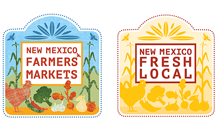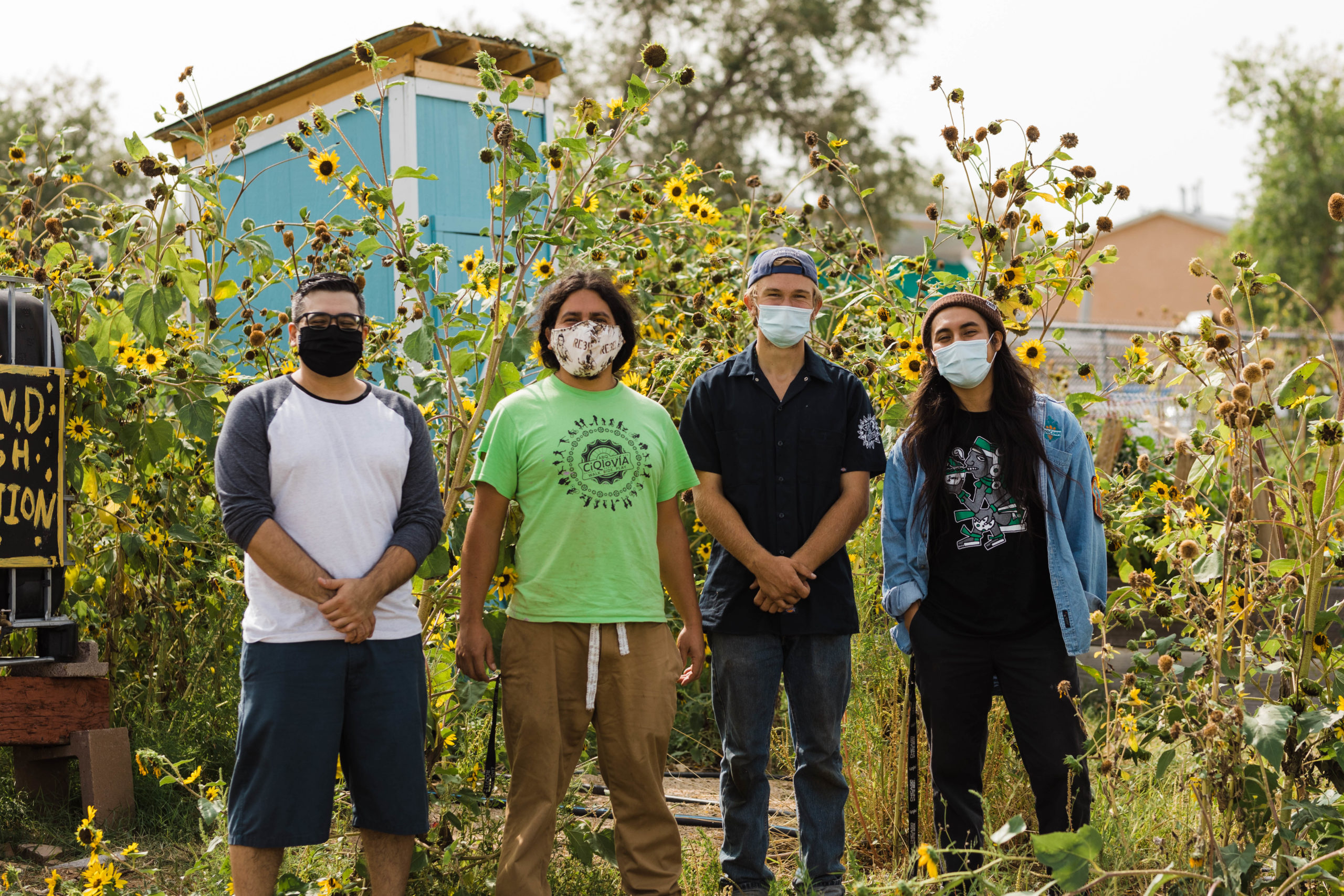
“Consciousness, relationships, justice, skills and leadership, community empowerment, positive social change, chickens, urban warrior corn, soil regeneration,” Juan Reynosa, deputy director of the Southwest Organizing Project (SWOP), provided this answer to the question: “What do you grow?”
Based in Albuquerque, SWOP member-based food and social justice organization has been serving low-income people of color for over 40 years. With the help of two grants totaling $15,000 from the New Mexico Farmers’ Marketing Association’s (NMFMA) COVID-19 Local Food Supply Chain Response Fund in the summer of 2020, SWOP continued growing food, investing in local youth, and providing free weekly boxes of locally grown produce to over 100 low-income, food-insecure SWOP members most affected by the pandemic.
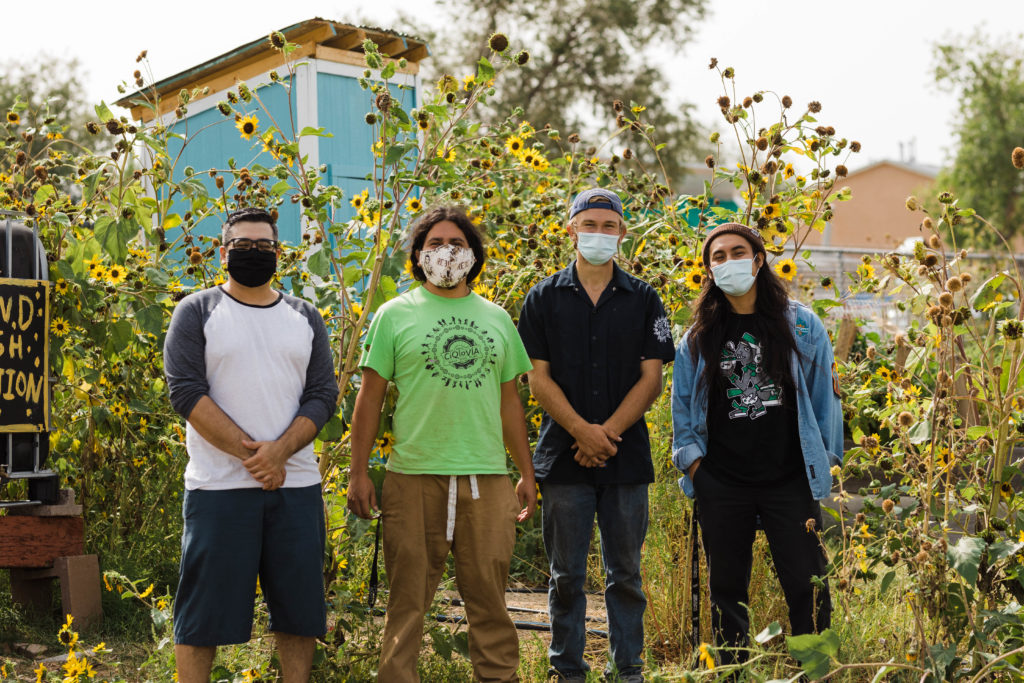
From left to right: Juan Reynosa (SWOP deputy director), Travis McKenzie (founder of the Feed the Hood project and community advocate), Anton Becker-Stumpf (FoodCorps intern), Mateo Carrasco (lead organizer for SWOP’s food justice work). (Photo by Elizabeth Evans.)
“We didn’t want to be an organization that talked about and made a bunch of videos about food justice and just put them online,” Mateo Carrasco, lead organizer for the organization’s food justice work, said. “We wanted to put what we knew into practice and actively practice food sovereignty.”
SWOP provisioned the food boxes with produce from two farms: Cornelio Candelaria Organics (CCO), a 300-year-old family farm in Albuquerque’s South Valley, and the International District Community Garden, located near the airport and home to Feed the Hood, SWOP’s food justice and community gardening initiative. Each 20- to 25-pound box contained a large variety of local produce, including green and yellow zucchini, zephyr squash, okra, blackberries, chard, kale, radishes, cilantro, carrots, and much more.
While designed to provide healthy, nutrient-dense produce to keep families going strong through the COVID-19 pandemic, SWOP’s deeply collaborative food justice work is also serving a critical role by bolstering the local food economy and keeping small farms like CCO in business during the unprecedented disruptions to the supply chain caused by the pandemic. Like many local farms, CCO lost a significant portion of its annual revenue when restaurants and other wholesale buyers were forced to shut down because of COVID-19. But in June and July 2020 alone, CCO was paid for over 575 pounds of produce that filled SWOP’s food boxes.
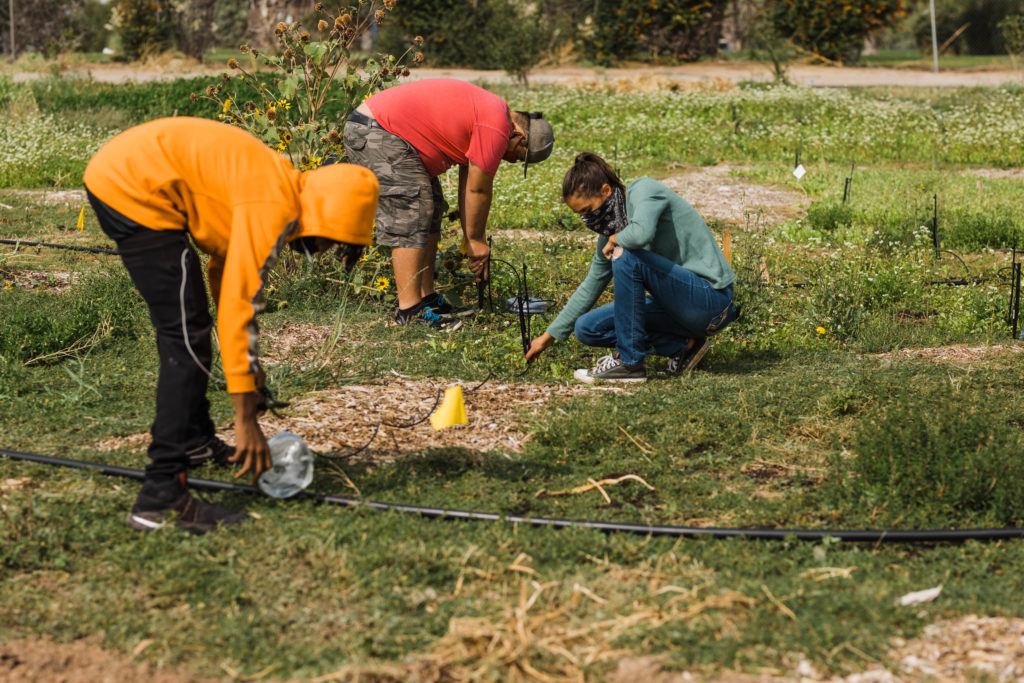
Student interns from the community and Kateri Sava, school garden specialist from Albuquerque Public Schools, set up irrigation for growing beds at the community garden. (Photo by Elizabeth Evans.)
Beginning in August 2020, the SWOP team shifted its focus — and its labor force — back to the community farm, where time was devoted to regenerating soil, planting cover crops, and developing no-till farming methods to ensure the farm is ready for youth interns, volunteers, and planting and providing food for the community soon thereafter.
“We’re going to grow food — culturally relevant food, nutritious food — but the whole vision is to create a garden that generates social change and empowers people,” Travis McKenzie, founder of Feed the Hood, said.
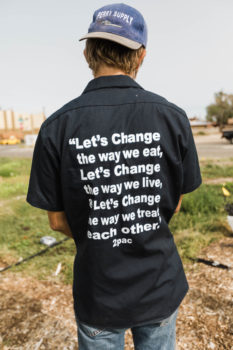
Anton Becker-Stumpf, FoodCorps intern, wears a t-shirt quoting 2Pac. (Photo by Elizabeth Evans.)
A big part of manifesting that vision is investing in the community’s youth. As Reynosa said, “Young people have the ability to create change.” With funding support from the New Mexico Acequia Association as well as the NMFMA grants, SWOP is engaging more youth in farming and social justice work through paid internships. Interns provide much needed farm labor, and SWOP believes their investment in the youths’ development helps ensure the work will continue.
“We’re paying living wages,” McKenzie said. “Youth [farm interns] have been helping their families pay household bills — think about how proud they are of that.”
SWOP maintained its current work helping keep low-income communities healthy and contributed to increasing food access in the pandemic through the food box project, and faced the unprecedented challenges created by the ongoing pandemic. SWOP is now even more determined to move forward and build lasting community resilience through social justice and food sovereignty, deep collaboration, a sincere investment in community youth, and “straight up blue-collar work,” as Reynosa said. Learn more about SWOP’s work at www.swop.net.
“New Mexicans are resilient people,” Reynosa said. “This [project] shows that we can easily adapt to the situation. That we can take care of each other.”
~~~
This story is part of a series featuring the many farmers, ranchers, nonprofit organizations, and collaborative groups who received grants via the NMFMA’s COVID-19 Local Food Supply Chain Response Fund. The Fund was designed to reduce economic hardship caused by market disruptions linked to the ongoing public health crisis and accelerate a sustained and equitable recovery among farmers and low-income communities. In total, $484,653.89 was distributed in 2020 to 100+ producers and groups. The tireless work and generous spirit of these individuals help solidify New Mexico’s local food system and ensure food access by those in need during an historic, global health crisis. Visit the NMFMA website to learn more and to contribute to the Fund.
By NMFMA Staff | August 2021
